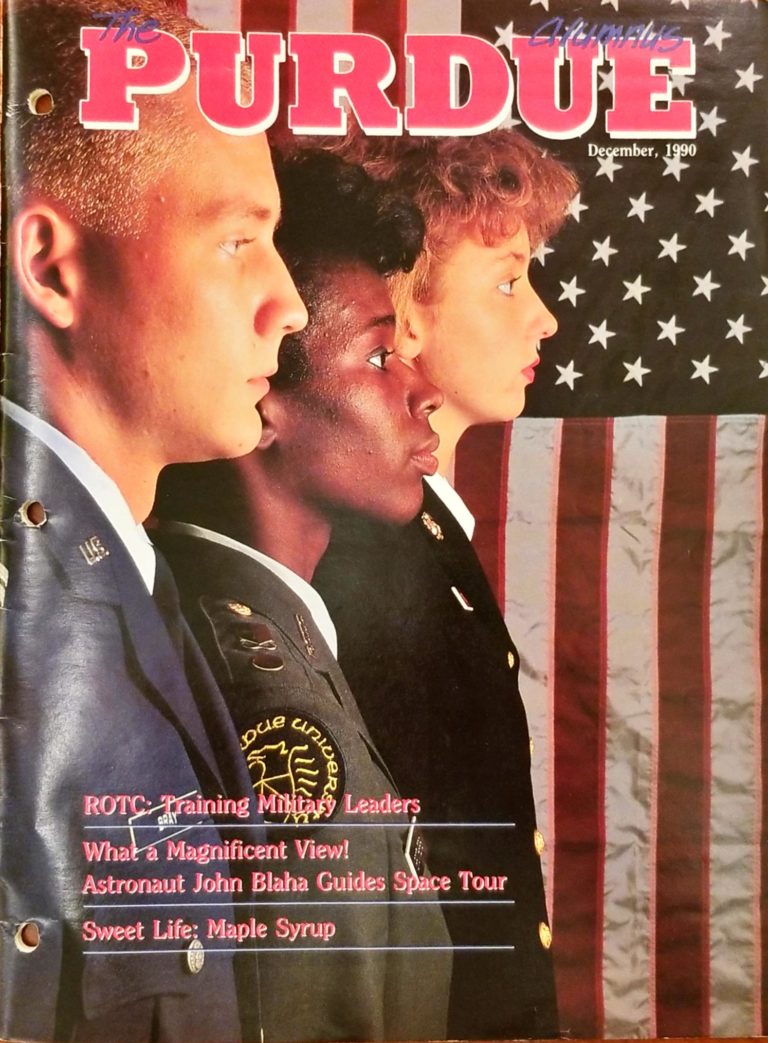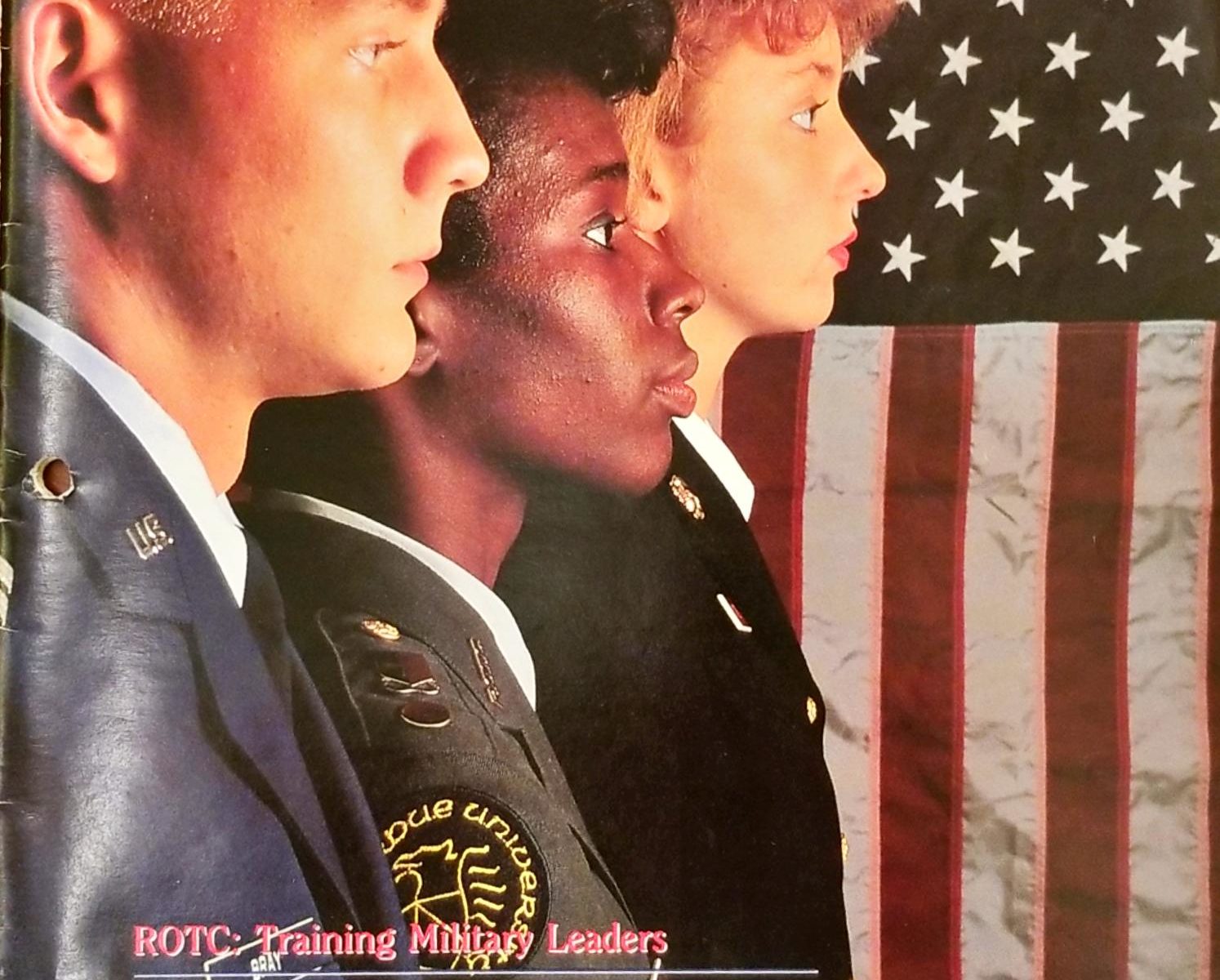Posted on January 15, 2020 by small20
The Modern-Day Woman in ROTC
by Stephen Goula

“Career opportunities are limited for women because they are prohibited from serving aboard Navy vessels”. (1) This quote is from Catherine Leahey, a writer for Boilerman. In her article she attempts to find the answer why women are restricted from serving in combat roles within the military. She argues the lack of a valid reason but points out, “the men, however, argue that women’s emotional nature and the stresses of a monthly cycle will render her unstable in a shipboard environment”. (2) As ridiculous of an argument this may seem, it was very real and very common. It took the military until the 1970s, well after women had proven their worth for military service during the two World Wars, to start integrating women into ROTC programs. Once ROTC programs across the nation began opening their ranks up to women, they began volunteering to become military leaders. When the Army opened combat jobs to women, they responded by once again volunteering to go above and beyond and join those jobs just like their male counterparts. Time and time again women showcased not only their desire to serve their country but also the capabilities and willingness to assume larger roles.
Currently enrolled in Purdue’s Army ROTC program as a freshman, Marisa Plagens said, “I’ve been wanting to join the military since sixth or seventh grade”. (3) Purdue’s ROTC program gives her that stepping stone to do so. Her internal desire to serve is nothing new to the female gender. During every war and throughout our nation’s history there are stories of women wanting to serve in a larger role within the military. Now it is a reality Marisa and other female cadets can enjoy. Marisa hopes to become an Army Physician Assistant and stated, “I’m pretty sure I want to stay in for my career now. I’m not just staying in for the minimum amount of time”. (4) Even though Marisa has been in ROTC for only one semester she loves what it does for her as a person “It gives me good life habits that I can either choose to use or go back to my old ways”. (5) She is currently one of the top performing freshman cadets within the program.
Life skills and habits are only some of the opportunities the Purdue ROTC program has to offer. In today’s day and age women are asked to carry out the same military responsibilities that men have, and Purdue’s ROTC program affords women that opportunity. In 2016 the United States Army opened combat jobs to women. This included jobs in the infantry and armor branches which are regarded as some of the more dangerous frontline careers. To female cadets like Cadet Molly Clark, a senior within the ROTC program, that is appealing. During her sophomore year summer, she went to West Point for one month to train. During her time there she was able to see different branches and their capabilities to include the combat arm branches. One of those branches was Armor. The Armor branch for the Army serves as a forward element on the battlefield and usually is known for facing the enemy early and often. When Molly Clark participated in the Armor branch day, she knew what she wanted to do saying, “We did a tank mission. There were four simulators for our platoon, and they were all working together on this one mission and I just thought it was the coolest thing ever”. (6) The Purdue ROTC program and its cadre members have helped push Clark to always strive to do better because “they were the ones who believed in me more than I did”. (7) She realizes as a female that it will not always be easy to be in a combat arms role and knows there is added pressure. “No. I don’t think it will level out, at all”, when asked about if there will always be pressure to perform, “You’re just going to have more eyes on you [as a female]”. (8) This pressure has already been felt by a male cadet, “I did have one say that I was going to be a horrible combat arms officer, I think because I was a female”. (9) But Molly does not think that those comments will ever fully go away. She just continues to prove others wrong and will be the Cadet Command Sergeant Major for the Spring 2020 semester. That is the second highest position in the ROTC Battalion. Molly Clark will graduate in May of 2020 with a degree in Kinesiology. After her graduation she will go to Fort Benning for nineteen weeks to attend Armor Basic Officer Leader course and possibly follow on schools like the Army Reconnaissance Course and Ranger School. She is one of two female cadets joining combat arms after their time at Purdue.
Purdue, along with the ROTC program has always been forward thinking in terms of military training. Being one of the first universities to allow women to join ROTC in 1972 to now fully supporting women who want to join combat arms roles has been one of the many reasons Purdue ROTC is highly regarded as a top tier military program. It already takes a unique person to raise their right hand for this country. Less than 1% of the population actual serves in the military. The gender of a person should not matter to what capacity they serve this country. It only matters that whoever raises their right hand to serve should be unrestricted in the choice they are making and the honor and privilege they feel in making that choice.

- Leahey, Catherine, Boilerman, March 1977, West Lafayette, IN. Purdue Archives.
- Leahey, Catherine, Boilerman, March 1977, West Lafayette, IN. Purdue Archives.
- Interview with Marisa Plagens, Dec. 5, 2019.
- Interview with Marisa Plagens, Dec. 5, 2019.
- Interview with Marisa Plagens, Dec. 5, 2019.
- Interview with Molly Clark, Dec. 6, 2019.
- Interview with Molly Clark, Dec. 6, 2019.
- Interview with Molly Clark, Dec. 6, 2019.
- Interview with Molly Clark, Dec. 6, 2019.
Picture of the Armory and Freedom Square in December of 2019.
Credit: Stephen Goula, West Lafayette, IN, Dec. 6, 2019.
Article cover from The Purdue Alumnus showing different branches of the military with mixed
genders.
Credit: The Purdue Alumnus, Dec. 1990. Purdue Archives, West Lafayette, IN.
Banner Image Reference in bold.
Category: Women and Military Leadership at Purdue Tags: 2000, feminism, military training, Purdue History, women leadership
